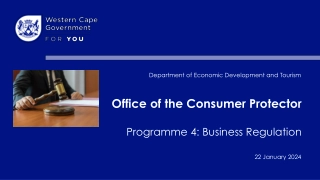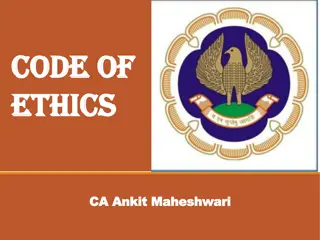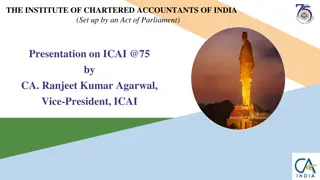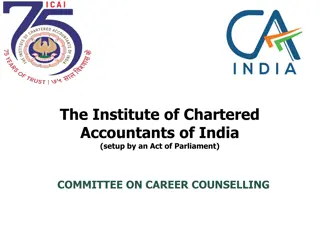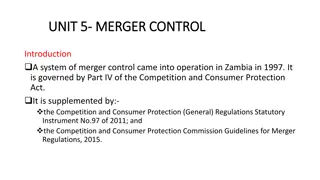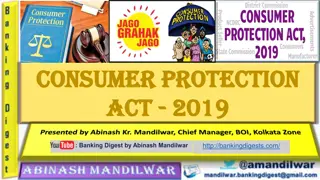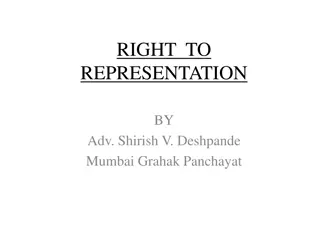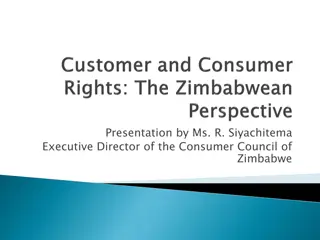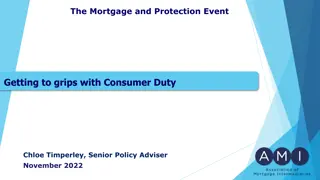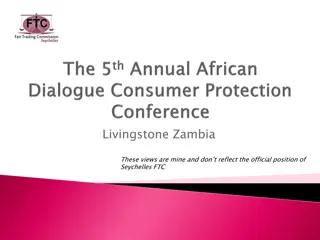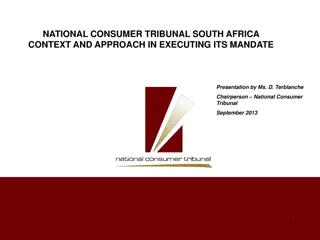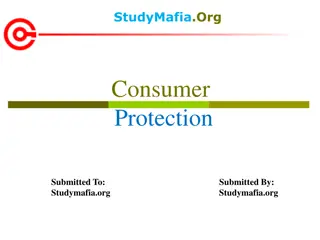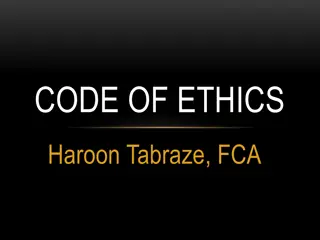Opportunities for Chartered Accountants under Consumer Protection Act
The Consumer Protection Act, 2019 aims to safeguard consumer interests and streamline dispute resolution. Chartered accountants can play a crucial role in ensuring compliance and protecting consumer rights under this Act, which applies across India except Jammu and Kashmir. The Act defines consumers, their rights, and sets standards for fair trade practices.
Download Presentation

Please find below an Image/Link to download the presentation.
The content on the website is provided AS IS for your information and personal use only. It may not be sold, licensed, or shared on other websites without obtaining consent from the author.If you encounter any issues during the download, it is possible that the publisher has removed the file from their server.
You are allowed to download the files provided on this website for personal or commercial use, subject to the condition that they are used lawfully. All files are the property of their respective owners.
The content on the website is provided AS IS for your information and personal use only. It may not be sold, licensed, or shared on other websites without obtaining consent from the author.
E N D
Presentation Transcript
Opportunities for Chartered Accountants Under Consumer Protection Act BY CS AKASH SHARMA, ADVOCATE CHAMBER OF ADV. AKASH SHARMA CHAMBER OF ADV. AKASH SHARMA ADVOCATES & SOLICITORS ADVOCATES & SOLICITORS 9, WESTON STREET, SIDDHA WESTON, 3RDFLOOR, SUITE NO. 312, KOLKATA 700013 Email: lawyerakash91@gmail.com PHONE: 8981216151
CONSUMER PROTECTION ACT, 2019 Enacted to provide for the better protection of the interest of consumers and settlement of consumers disputes. In 2019, amongst the uproar and protest against abrogation of Article 370 of the Constitution, the Government of India passed the Consumer Protection Act 2019 (2019 Act) through the parliament and hailed it as a tool to protect consumer rights and simplify consumer dispute resolution mechanism. Act applies to whole of India except Jammu and Kashmir Chapter I, II, IV to VIII came into force on 20.07.2020 and some Chapters and Sections came into force on 24.07.2020.
CONSUMER AND COMMERCE DEFINING E- Person who "buys any goods" and hires or avails of any service" for consideration but does not include a person who obtains goods for resale or goods or service for commercial purpose. Consideration may be fully paid, partially paid or fully promised to be paid or partially promised to be paid . In the 1986 Act, the definition of a consumer was only limited to buying goods or services and did not specifically include e-commerce transactions A Consumer will now mean any person who "buys any goods" and "hires any service" which shall include both
*WHO IS A CONSUMER ? online and offline transactions through electronic means, teleshopping, direct selling, or multi-level marketing. However, any person who buys goods for commercial use but exclusively for his livelihood by means of self employment is a consumer.
CONSUMER RIGHTS The New Act has defined six specific consumer's rights including the right to:- Be protected against marketing of goods and service which are hazardous to life and property; Be informed of the quality, quantity, potency, purity, standard and price of goods or services; Be assured of access to a variety of goods or services at competitive prices; Be heard and assured that the consumer's interest will receive due consideration at appropriate fora; Seek redressal against unfair or restrictive trade practices; Consumer awareness.
NEW ADDITIONS TO CERTAIN DEFINITIONS The New Act includes the definition of "food" as defined under the Food and Standards Act, 2006. This has replaced the definition of "goods" under the 1986 Act. This would help in bringing the number of food delivery platforms (SWIGGY, ZOMATO, ETC.) to come under the ambit of consumer protection. In order to bring the telecom services under the New Act, "telecom" has been added to the definition of "services" However, it would have been much better if such inclusion was added "telecommunication service" as defined by the Telecom Regulatory Authority of India Act (TRA), rather than "telecom". [6].
ADVERTISEMENT AND MISLEADING ADVERTISEMENT: Under the New Act "advertisement" shall mean any audio or visual publicity, representation, endorsement or the pronouncement made by means of light, sound, smoke, gas, print, electronic media, internet or website and includes any notice, circular, label, wrapper, invoice or such other documents. Under the New Act "misleading advertisement" in relation to any product or service, means an advertisement, which (i) falsely describes such product/service; or (ii) gives a false guarantee to, or mislead the consumers as to nature, substance, quantity or quality of such product/service; or (iii) conveys an express or implied representation which, if made by the manufacturer or seller or service provider thereof would constitute an unfair trade practice; or (iv) deliberately conceals important information.
PROACTIVE STEPS TO CURB MISLEADING ADVERTISEMENTS: Considering the ever-increasing presence of media and its influence, the New Act intends to cover all kinds of audio or visual publicity and representations made in electronic media, internet and websites under its ambit. It is a prevalent market practice to engage eminent personalities (Actor/Actress/Influencer) or celebrities (Bollywood/Cricket) for the endorsement of products. Such personalities/endorsers are deployed to make advertisements which are often misleading (FAIR & LOVELY) by making unrealistic claims. In such cases, it becomes important for the endorser to take the onus and exercise due diligence to verify the veracity of the claims made in the advertisement to refute liability claims.
Under the New Act, the Central Consumer Protection Authority ("Central Authority"), has the power to issue directions and penalties against false and misleading advertisements. If satisfied after investigation that any advertisement is false or misleading and is prejudicial to the interest of any consumer or is in contravention of consumer rights, it may, by order, issue directions to the concerned trader or manufacturer or endorser or advertiser or publisher, as the case may be, to discontinue such advertisement. If a misleading advertisement is found to be prejudicial to the interest of consumers, then the Central Authority may impose a penalty of up to Rs. 10,00,000/- on a manufacturer. In case of a subsequent offence, the fine may extend to Rs. 50,00,000/-
If a misleading advertisement is found to be prejudicial to the interest of consumers, then the Central Authority may impose a penalty of up to Rs. 10,00,000/- on the endorser. The Central Authority can also prohibit the endorser of a misleading advertisement from endorsing that particular product or service for a period of up to 1 (one) year. For every subsequent offence, the fine may extend to Rs. 50,00,000/- and the period of prohibition may extend to 3 (three) years. However, no endorser shall be liable to a penalty if he has exercised due diligence to verify the veracity of the claims made in the advertisement regarding the product or service being endorsed by him. Separately, the New Act has also made misleading advertisements a criminal offence to publish false or misleading advertisements for manufacturers and services providers. If found guilty, they could be sentenced to imprisonment for up to 2 (two) years. In the case of a subsequent offence, the term of imprisonment may extend to 5 years.
UNFAIR CONTRACTS Under the 1986 Act, a Consumer could file a complaint only for an unfair trade practice or restrictive trade practice adopted by the trader/service provider. However, there were numerous instances where consumers, left with little option, entered into agreements/contracts that were unilateral and arbitrary in nature, and were bound by them. Quite often the terms and conditions in the contracts are heavily one sided protecting the interests of the vendor or the electronic service provider and the consumer will not have any chances of negotiation or bargain for the modification of the terms of such contracts. Thus keeping in mind the present dilemma, under the New Act, Consumers can challenge contracts that are unreasonable. "unfair contracts" has been added as a ground for filing complaints in the New Act.
UNFAIR TRADE PRACTICE While 1986 Act had listed six (6) types of unfair trade practices, three (3) types of additional unfair trade practices have now been added to the list which are as follows:- failure or non-issuance of a bill or a cash memo; refusal to take back or withdraw defective goods or withdrawal or discontinuance of deficient services or refusal to refund the consideration amount paid. disclosure of consumer's personal information to any other person unless such disclosure is made in accordance with the provisions of any law for the time being in force or in the public interest. Note: The section fails to give any clarity on whether information can be shared if consent is taken from the consumers.
PRODUCT LIABILITY There was no separate legislation governing 'product liability' in India, though it was addressed under 1986 Act, if parties were included within the ambit of 'consumer'. Insertion of "Product Liability" as a separate chapter in New Act and a new ground for filing a complaint (one of the most significant additions in the New Act). Under the New Act, "Product Liability" is defined as the responsibility of a product manufacturer or product seller, of any product or service, to compensate for any harm caused to a customer by such defective product manufactured or sold or by deficiency is service-related thereto.
CENTRAL (CCPA) CONSUMER PROTECTION AUTHORITY The New Act seeks to establish a Central Consumer Protection Authority (to be termed as Central Authority) that will promote, protect and enforce the rights of consumers as a class. The Central Authority will regulate matters relating to violation of consumer rights including unfair trade practices, misleading advertisements, etc. that are detrimental to consumer interest. The headquarters of the Central Authority is currently at Delhi. The Central Authority can also take up suo moto cases.
Purpose of CCPA: To conduct any inquiry or investigation The inquiries or the investigation made by the Director General should by submitted to the CCPA. CCPA to be established by Central Government and to have an Investigation Wing headed by DG.
Nature of Complains to be made: Violation of: (i) Consumer Rights (ii) Unfair trade practices (iii) False or misleading advertisement Prejudicial to the interests of consumer as a class to be made to: (i) District Collector (ii) Commissioner of Regional Office of CA (iii) Central Authority
IN A NUTSHELL ANALYSIS BETWEEN 1986 ACT AND THE NEW ACT Key Points Pecuniary Jurisdiction 1986 Act District forum up to 20 lakhs New Act (2019) District Commission up to 1 crore State commission - from 1 crore to 10 crore State commission - from 20 lakhs to 1 crore National commission - from 10 crore and above National commission - from 1 crore and above Where has office NA NA NA Territorial Jurisdiction Regulator Mediation E- Commerce Product Liability seller Where complainant resides or works Central Consumer Protection Authority is formed. Courts can refer settlement through mediation. E-Commerce transactions will come under the provisions involving direct sales Consumers have the right to seek compensation for any harm caused. NA
Pecuniary Jurisdiction: the New Act has also changed the manner for determining the pecuniary jurisdiction for filing the Complaint. Now the pecuniary jurisdiction will be determined on the basis of the value of goods or services paid as consideration as against the Old Act wherein, the pecuniary jurisdiction was determined as per the value of goods and services as well as compensation claimed. This would help in doing away the practice of inflating the compensation claimed so as to bring the complaint within the jurisdiction of State or National Commission. E-Complaints: The New Act also contains enabling provisions for consumers to file complaints electronically and for hearing and/or examining parties through video-conferencing. Alternate Dispute Resolution: Another provision introduced by the New Act to ensure speedy resolution of disputes is to provide for referring the disputes to mediation
Penalty for non-compliance of orders: Under 1986 Act, failure to comply with orders passed by the District Forums or the State Commissions or the National Commission attracted a punishment of imprisonment for a term not less than one month, but which could extend to three years, or with fine, which was not less than two thousand rupees and could extend up to ten thousand rupees, or with both. However, the New Act retains the same term of imprisonment for non-compliance, the fine has been increased to twenty five thousand rupees, which may extend to one lakh rupees, or both.
Power of Review: Under the 1986 Act, the aggrieved parties did not have any recourse other than filling an appeal to the State or the National Commission to set right the errors made by the District Forum or the State Commission respectively. However, under the New Act, the District, State and National Commissions have been vested with the power to review its own orders where an application is filed for within 30 days of passing such an order.
Appeal against the order of DISTRICT Commission: If a party is aggrieved by the order of the district commission then they may prefer an appeal to the State Commission within 45 days of receiving such order. However, minimum 50% of the amount must be paid before the State Commission will hear the appeal. Appeal against the order of the STATE Commission: If aggrieved by the decision, the aggrieved party may prefer an appeal to the National Commission within 30 days of receiving the order from the state commission. However, minimum 50% of the amount must be paid before the National Commission will hear the appeal. Appeal against the order of the NATIONAL Commission: If aggrieved by the decision then an appeal does lie to the Supreme Court if made within thirty days of receiving the order. However, minimum 50% of the amount must be paid before the Supreme Court will hear the appeal.
HIERARCHY DISTRICT COMMISSION STATE COMMISSION NATIONAL COMMISSION SUPREME COURT
CONSUMER PROTECTION ACT LEGAL NOTICE COMPLAINT u/s 35 (Two Years Limitation) JURISDICTION TERRITORIAL JURISDICTION PECUNIARY JURISDICTION
Rejoinder (Its not Mandatory but Subject to filling) Evidence by complainant Evidence by Opposite Party Written Argument by both the parties Final Argument
CASE LAWS: Arbitration Jurisdiction, NCDRC Allows Complaint Against Jai Prakash Associates Ltd. Clauses Do Not Bar Consumer Commissions' Case Title: Dharamvir Singh and Anr. vs Jai Prakash Associates Limited and Anr. The National Consumer Disputes Redressal Commission (NCDRC), New Delhi bench held Jai Prakash Associates Ltd. and its subsidiary, Jaypee Sports Int. Ltd. liable for failure to deliver the possession of the housing unit to the Complainant within the stipulated time. Further, the Builder's defence that the agreement had an arbitration clause was rejected as it was held that Consumer Forum's remedies stand in addition to the Arbitration and Conciliation Act, 1996.
Missing Luggage From Reserved Train Compartment, Rohtak District Commission Directs Indian Railways To Pay Rs. 2.5 Lakhs For Negligence Case Title: Monika Rani vs Indian Railways The District Consumer Disputes Redressal Commission, Rohtak (Haryana) bench held the Station Superintendent of Rohtak Railway Station liable for negligence and inadequate security and safety of passengers' belongings. It directed the railway authority to pay a compensation of Rs 2,50,000 to a Complainant whose language was stolen during the train journey.
Railways Not Liable For Theft Incidents, Passengers Must Be Vigilant, M.P. State Commission Allows Western-Central Railways' Appeal Case Title: Western Central Railway Division Vs Rajendra Kumar Agrawal & Another The State Consumer Disputes Redressal Commission, Madhya Pradesh allowed an appeal filed by the Western Central Railway Division, Jabalpur against a passenger who alleged theft of his belongings while travelling on the train. The State Commission held that the Railways cannot be held responsible for the stolen luggage when the Complainant himself wasn't vigilant.
The Late Arrival of Trains Without Justifiable Reasons Places Liability On The Railway Authorities: Ernakulam District Commission Case Title: Karthik Mohan v. Ministry of Indian Railways The District Consumer Disputes Redressal Commission, Ernakulam (Kerala) bench stated that the passengers have the right to timely and quality services and shouldn't be subject to the whims of the administration. It was further asserted that the Railways must provide valid reasons for any significant delays due to unforeseeable circumstances. The Judgment reaffirmed that passengers' time is invaluable, and they deserve compensation for undue delays unless the Railways can prove a justifiable cause
Bihar State Commission Awards Additional Remedies to Passengers Robbed And Stabbed On Train, Railways Liable For Failure To Protect Lives Of Passengers Case Title: The Chairman, Railway Board and others vs Premshila Devi and others. The Bihar State Consumer Disputes Redressal Commission bench held the Railways Board, East-Central Railways and the Divisional Rail Manager of the Samastipur Division liable for failure to protect the lives of the passengers. The passengers were robbed, hit and stabbed when the train was going to Motihari station. The State Commission upheld its jurisdiction and held that consumer commissions can grant additional remedies even when certain remedies have already been granted under the Railways Act.
South West Delhi District Commission Holds McDonald's Liable For Sending Different Meal Of Lower Value And Failure To Refund Case Title: Nitesh Garwal vs Connaught Plaza Restaurants Private Limited and Ors. The District Consumer Disputes Redressal Commission, South West Delhi bench held McDonalds liable of deficiency in service for sending a different meal altogether, priced lower than what the Complainant had paid for. It was directed to pay a compensation of Rs 10,000 to the Complainant.
Sale of Medicine Different from Prescription, Thiruvananthapuram District Commission Holds STV Medicals & Surgicals Liable Case Title: Subha B vs The Proprietor, STV Medical and Surgicals The District Consumer Disputes Redressal Commission, Thiruvananthapuram (Kerala) bench held STV Medical and Surgical Medical College (Trivandrum) liable of deficiency in service and unfair trade practice for selling a medicine different from the medicine prescribed by the doctor. The District Commission directed it to pay a compensation of Rs 1,05,000 to the Complainant.
Delay In Construction And Delivery Of Flat, NCDRC Directs DK Reality To Refund Amount With Interest Case Title: Amresh Pednekar vs. D.K. Realty (India) Pvt. Ltd. The National Consumer Disputes Redressal Commission partly allowed a consumer complaint against D.K. Realty India Pvt. Ltd. (Opposite Party) for the delay in construction of a housing project named "Livsmart." The main contention was based on the delay in delivering the flat as per the agreed timeline and subsequent failure to respond to the complainant's requests for cancellation and refund. As a result, the Commission held D.K. Reality liable, directing them to refund the entire amount deposited along with 9% interest per annum.
Dancing Swing Ride Accident, NCDRC Directs Rizvana Amusement Co. To Pay Rs. 35 Lakhs to Complainant Case Title: Abhimanyu Singh vs Rizvana Amusement and 2 others The National Consumer Disputes Redressal Commission (NCDRC) bench held Rizvana Amusement, an amusement swing operator liable for deficiency in service due to an accident on a 'Dancing Chairs' swing which caused serious injury to the Complainant. The NCDRC awarded Rs. 25,00,000/- as pecuniary compensation and Rs.10,00,000/- as non-pecuniary compensation to the Complainant.
Deficiency In Hair Treatment Service, An Health Care Service Still Covered Under Amended Consumer Protection Act., Delhi State Commission Case Title: Dr. Monica Gogia vs. Mr. Goldy Sahni The Delhi State Consumer Disputes Redressal Commission bench comprising Justice Sangita Dhingra Sehgal (President) and Ms. Pinki (Member) dismissed an appeal challenging the validity of 'healthcare' services being included in the ambit of 'services' under Section 2(42) of the Consumer Protection Act, 2019.
Delhi State Consumer Disputes Redressal Commission Holds Postal Department Liable For Deficiency Of Service Case Title: Daya Ram Vs. Karol Bagh Post Office The Delhi State Consumer Disputes Redressal Commission bench rejected the arguments of respondent based on Section 6 of the Indian Post Office Act, 1898 in light of allegations of negligence. The bench further highlighted that if an addressee of the letter can reasonably demonstrate the likelihood of intentional negligence by a Postal Department employee, the responsibility shifts to the department to substantiate its denial.
Unilateral Cancellation Of Ticket And Denial Of Refund, Gurgaon District Commission Holds Yatra Online And British Airways Liable Case Title: Parminder Oberoi vs Yatra Online Pvt. Ltd. and Anr. The District Consumer Disputes Redressal Commission, Gurgaon (Haryana) bench held Yatra Online and British Airways liable for unilateral cancellation of the Complainant's ticket and subsequent denial for adequate refund or resolution for over 2 years. The District Commission asked them to refund the Complainant's ticket amount, and pay Rs. 50,000/- compensation for mental agony, Rs. 50,000/- deterrent compensation and Rs. 33,000/- legal costs.
Coaching Institutes Should Not Have Right To Retain Fees Of Students Who Leave Course Midway: Kerala Consumer Commission Case Title: Zeba Salim v. M/S VLCC Health Care Ltd. & Anr. The District Consumer Disputes Redressal Commission at Ernakulam recently ordered a refund of fees to a student who had enrolled in courses offered by VLCC Institute, Kochi, but subsequently got cancelled due to failure on the part of the institute to offer timely classes, even through online mode. The underscored the importance of protecting consumers in the education sector, by ensuring refund of fees to students who choose to leave a course midway.
Chandigarh District Commission Holds MakeMyTrip, Essence Retreat Hotel and OYO Rooms Liable for Arbitrary Hotel Cancellation, Orders Compensation The District Consumer Disputes Redressal Commission-I, U.T. Chandigarh, recently allowed a consumer complaint against MakeMyTrip (Opposite Party No. 1). The complainant had booked a hotel through Goibibo (Opposite Party No. 2), for a family vacation. However, just before the journey, they were informed of the hotel's unavailability, leading to cancellation and a refund. The commission found that despite the cancellation claim due to the hotel being non-operational, the same rooms were available online at significantly higher rates. Thereby the commission concluded that the cancellation was arbitrary and caused immense mental harassment to the complainant. As a result, MakeMyTrip was held responsible for causing mental agony and harassment to the complainant and directed to pay compensation of Rs.35,000/- and litigation costs of Rs.7000/-.
Shimla District Commission Holds MakeMyTrip And Its Relationship Manager Liable For Retention Of Amount Of A Cancelled Trip Due To Covid-19 Case Title: Vatsal Agarwal vs Make My Trip India and Others The District Consumer Disputes Redressal Commission, Shimla (Himachal Pradesh) bench held MakeMyTrip India Pvt. Ltd. and its Relationship Manager liable for unfair trade practice and deficiency in service for their failure to refund the entire amount of a booked trip which was cancelled due to the Covid- 19 pandemic. The District Commission noted that a resolution was reached and a refund was initiated only after the filing of the complaint. Therefore, MakeMyTrip was directed to pay compensation and litigation costs to the Complainant.
Chandigarh District Commission Holds AJIO And Reliance Retail Liable For Charging More Than The Product's MRP Case Title: Deepika Bhardwaj vs Ajio and Anr. The District Consumer Disputes Redressal Commission-I, U.T. Chandigarh bench held Reliance Retail Limited and its lifestyle brand, AJIO liable for deficiency in service and unfair trade practices for selling and delivering a laptop briefcase over its original MRP.
Bangalore District Commission Finds Hotel Liable For Deficiency In Service For Selling Chicken Biriyani Without Any Chicken Pieces The District Consumer Disputes Redressal Commission, Bangalore (Urban) has held a hotel liable for deficiency in service for serving only biriyani without any pieces of chicken to a customer who had ordered Chicken Biryani. The commission presided over by President M. Shobha P, partly allowed the complaint and directed the owner of the hotel to refund Rs 150 paid towards the amount paid for the Chicken Biryani and Rs.1,000/- as compensation within 30 days from the order.
Wrongful Denial Of Insurance Claim, East Delhi District Commission Holds HDFC ERGO Gen. Insurance Co. Liable Case Title: Daljeet Kaur Vs Apollo Munich Health Ins. The District Consumer Disputes Redressal Commission, East Delhi (Delhi) bench held HDFC ERGO General Insurance Company Ltd. liable for denying a valid insurance claim, citing reasons which were not informed to the Complainant at the time of availing the policy. Further, the District Commission held that the Complainant was not under an obligation to reveal immaterial facts, unconnected to the ailment, at the time of availing the policy.
Cuttack District Commission Holds Apollo Hospitals Liable For Non-Disclosure Of Estimated Treatment Expenses Case Title: Ramesh Chandra Pattanaik and others and Apollo Hospitals Enterprise Ltd and others. The District Consumer Disputes Redressal Commission, Cuttack (Odisha) bench held Apollo Hospitals Enterprise Ltd. liable for non-disclosure of estimate costs to the family members of the patient. The District Commission reiterated the duty of medical institutions to maintain transparency in providing estimated treatment expenses to the patients and their families, in line with the Indian Medical Council Act, 1956.
Delivery Of Second Hand iphone Instead Of New, Shimla District Commission Holds Amazon And Listed Reseller Liable For Unfair Trade Practices Case Title: Narinder Kumar vs Apple India Private Ltd and another. The District Consumer Disputes Redressal Commission, Shimla (Himachal Pradesh) bench held Amazon and M/s Arhum IT, a listed mobile phone reseller liable for unfair trade practices for delivering a differently coloured iPhone and charging for it at par with a new iPhone, even when it was a refurbished and second- hand iPhone.
Is Education A Service Under Consumer Protection Act ? The Supreme Court bench comprising Justices DY Chandrachud and BV Nagarathna noted that this issue is pending consideration in another case titled Manu Solanki vs Vinayaka Mission University. In this case, a boy participated in Summer Camp organized by his school. He drowned in the swimming pool of the school and later died. His father filed a Consumer Complaint in the State Consumer Disputes Redressal Commission alleging negligence and deficiency in service on part of the School. The State Commission dismissed the complaint as not maintainable. In appeal, the National Consumer Disputes Redressal Commission took note of its larger bench decision in Manu Solanki and Ors. v Vinayaka Mission University and Supreme Court judgments and held that Educational Institutions do not fall within the ambit of the Consumer Protection Act, 1986 and education which includes co- curricular activities such as swimming, is not a "service" within the meaning of the Consumer Protection Act, 1986. Therefore, it dismissed the appeal.
Death By Drowning In Swimming Pool, The State Consumer Commission Directs The Club To Pay 35 Lakhs Compensation The Kerala State Consumer Disputes Redressal Commission allowed a complaint against Aquatic Club in Kerala. The complaint revolves around the tragic death of the complainant's 22-year-old son, Abhijith, who drowned in the club s swimming pool. While observing that the swimming pool facility was dangerous and no actual lifeguard was present, the commission found the Aquatic Club liable for deficiency in services and ruled that the drowning of the deceased in the swimming pool was a direct consequence of the negligence on their part.
Failure To Refund Money Deducted From Unauthorized Transactions, Hyderabad District Commission Holds Union Bank of India Liable The District Consumer Disputes Redressal Commission I, Hyderabad (Telangana) bench held Union Bank of India liable for deficiency in services for failure to provide security measures to the Complainant's bank account and her credit card which resulted in unauthorized transactions of Rs. 88,232/- from her account. The bench, noting that the bank already paid Rs. 20,790/-, directed it to pay Rs. Rs. 67,437.52/-.
CAN ADVOCATES/CHARTERED ACCOUNTANTS/CS/CMA BE HELD LIABLE FOR DEFICIENCY OF SERVICE UNDER CPA? Case Title: Nandlal Lohariya Vs Jagdish Chand Purohit and others, SLP (C) DIARY NO. 24842 OF 2021 decided on November 8, 2021. The brief facts of the case are that the Petitioner filed three complaints before the District Forum through three advocates against BSNL which were dismissed by the District Forum on merits. Thereafter the petitioner filed a complaint under the Consumer Protection Act against the three advocates who appeared on his behalf alleging deficiency in service on their part in contesting his cases before the District Forum and demanded a compensation.
The District Forum, the State Commission and the National Commission dismissed the said complaints against which SLP was filed in the Apex Court. The Apex Court dismissed the SLP as there are no observations by the District Forum against the advocates that there was any negligence on the part of the advocates in prosecuting and/or conducting the complaints. Thus, the Apex Court has held in clear terms that if the advocate/ chartered accountant is not found guilty of negligence, he could not be prosecuted under the Consumer Protection Act. On the contrary, if there is deficiency in service like non appearance, abstaining from court, non filing of replies, not arguing the matter or any such act which is detrimental to the interest of the client, the advocate/CA can be held be held liable for compensation under the Consumer Protection Act. Similarly, if the Chartered Accountant commits an error in audit or files an erroneous return, advertently or inadvertently, which results in imposition of Tax, Prosecution or Penalty, or in any case is prejudicial to the interest of the taxpayer, the concerned CA can well be prosecuted under the provisions of the Consumer Protection Act.


